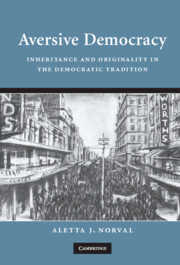Book contents
- Frontmatter
- Contents
- Acknowledgements
- Introduction: towards an aversive account of democracy
- 1 Democracy, universalization and (dis)agreement
- 2 Democratic argumentation: rhetoric and imagination
- 3 Democratic identification and aspect change
- 4 Democratic subjectivity: the promise of democratic community
- 5 Conclusion: aversive democracy – exemplarity, imagination and passion
- Bibliography
- Index
1 - Democracy, universalization and (dis)agreement
Published online by Cambridge University Press: 22 September 2009
- Frontmatter
- Contents
- Acknowledgements
- Introduction: towards an aversive account of democracy
- 1 Democracy, universalization and (dis)agreement
- 2 Democratic argumentation: rhetoric and imagination
- 3 Democratic identification and aspect change
- 4 Democratic subjectivity: the promise of democratic community
- 5 Conclusion: aversive democracy – exemplarity, imagination and passion
- Bibliography
- Index
Summary
Democratic theorists now take deliberation to be the exemplary practice or activity for democrats, and they gear their arguments toward its realization.
A picture held us captive. And we could not get outside of it.
An explosion onto the scene of new claims and demands mark contemporary politics. Sometimes they become sedimented into a specific or wider programme of action. At other times, the demands remain isolated, unable to appeal to a wider audience or even to sustain themselves in their particularity. The reasons for the seeming frequency of emergence of new demands are multiple, ranging from the speed of contemporary life, and the dislocations and disruptions associated with it, to the ability of issues to transcend borders at a pace previously unknown. A key task of democratic theory today is to address, account for and analyse the formation and character of these demands. This involves giving attention to a number of different issues. We need to be able to understand the structure of such demands, including the varied elements – verbal and non-verbal, rational, emotional and imaginative – that go into their formation. In addition, consideration has to be given to how demands become universalized and to the nature of such universalization. A plethora of further questions arise in this respect.
- Type
- Chapter
- Information
- Aversive DemocracyInheritance and Originality in the Democratic Tradition, pp. 18 - 55Publisher: Cambridge University PressPrint publication year: 2007



